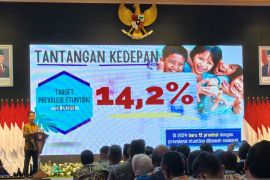We have to make sure that all Indonesian toddlers don't get infected so that their nutrition doesn't go to waste, and it can be used for their growthJakarta (ANTARA) - Stunting in children is closely correlated with several diseases that cause recurrent infections, Health Minister Budi Gunadi Sadikin has said.
"Stunting can be caused by malnutrition, due to insufficient input of (nutritional foods), or a lot of nutrients being wasted. It's usually caused by an infection," he noted during a webinar on stunting prevention, which was followed online from here on Thursday.
According to Minister Sadikin, the ministry has identified two diseases that cause the most recurrent infections in children.
They are pneumonia, or an acute infection of the lower respiratory tract that affects the lungs, and diarrhea.
Recurrent infections of the two diseases often occur due to an uninhabitable living environment, he said.
They can also be experienced by children who have not completed routine basic immunization, which affects the absorption of nutrients from food.
To protect Indonesian children, the Health Ministry has added PCV vaccines to treat pneumonia and rotavirus, which causes diarrhea, in the basic immunization program for children.
"We have to make sure that all Indonesian toddlers don't get infected so that their nutrition doesn't go to waste, and it can be used for their growth," Sadikin said.
He then advised parents to improve the cleanliness of the environment where children live and immediately avail the free vaccinations for children.
Minister Sadikin further said that stunting needs to be a concern because it has the same stages of growth as cancer.
In the first stage, a child's weight does not increase, and this is called weight faltering.
If this is not corrected immediately, the child can quickly become underweight or weigh below average.
"If this is also not handled properly, this disorder goes into moderate acute malnutrition or undernutrition. If this is also not handled properly, it will turn into severe acute malnutrition or malnutrition, then stunting," said Sadikin.
"So what needs to be realized is don't let our children experience stunting," he added.
He highlighted that taking a child's weight is an intervention at the earliest stage.
If after two measurements, a child's weight does not increase, parents must immediately approach a community health center (puskesmas).
One of the interventions that are needed is providing complementary foods that contain animal proteins from eggs, fish, chicken, or meat, not biscuits or other carbohydrate foods.
"It is very difficult for toddlers who have experienced stunting to return to normal because it is too late," the minister said.
"In Indonesia, on average, only 5 percent of stunted children can return to normal growth," he added.
"We recommend that the intervention can be maintained up to 20 percent. Therefore, parents should try hard so that their child does not become stunted," he added.
Related news: Sociocultural factors widen risk of stunting: minister
Related news: Stunting prevalent among children aged 6-24 months: Minister
Related news: BKKBN strengthens competence of Family Assistance Team in East Java
Translator: Hreeloita Dharma Shanti, Katriana
Editor: Sri Haryati
Copyright © ANTARA 2023












